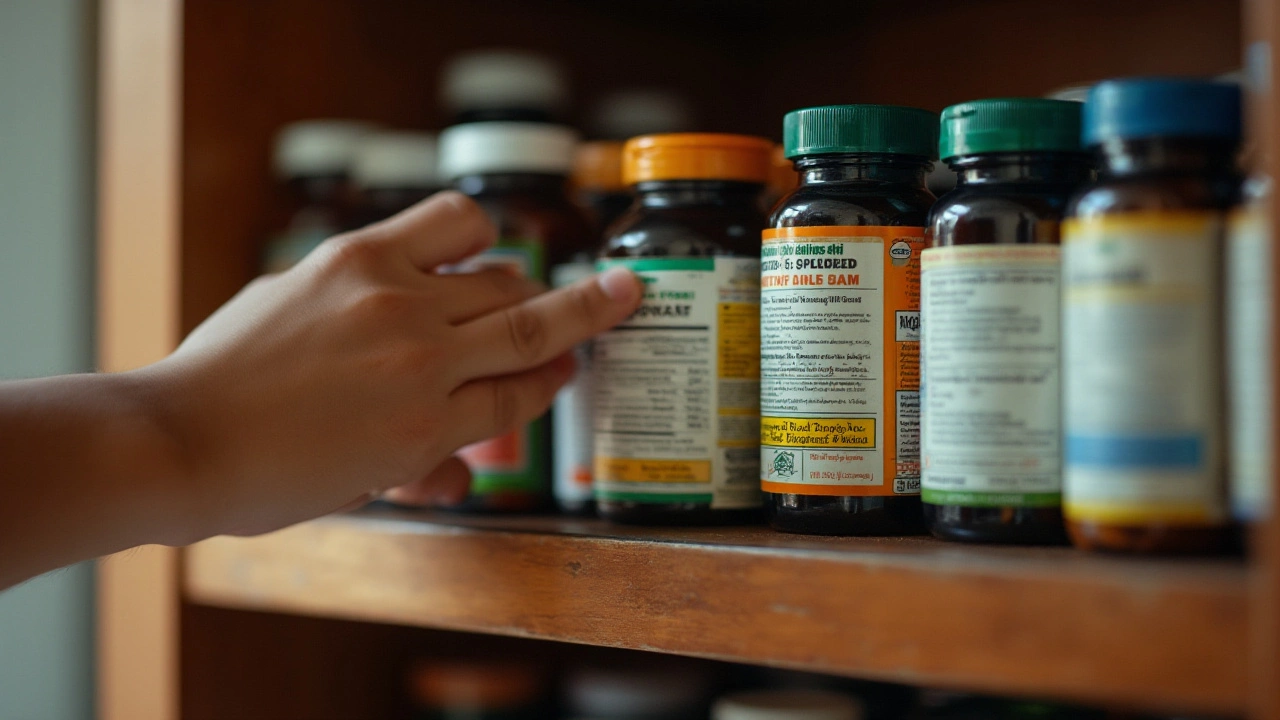- Home
- ::
- Understanding FDA Regulations for Herbal Supplements

Understanding FDA Regulations for Herbal Supplements
Herbal supplements have carved out a significant niche in the world of health and wellness, offering natural alternatives to pharmaceutical drugs. As you wander through the aisles of a health store, you might wonder about the rigorousness of their safety checks. Do these products undergo government approval, or are they simply trusted based on traditional knowledge?
Understanding the regulatory framework that governs these products is crucial for both manufacturers and consumers. The FDA's role isn't to approve herbal supplements before they reach the market. Instead, it steps in if safety issues arise post-marketing. This can lead to confusion for individuals seeking reliable health solutions.
Join us as we delve into the complexities of FDA regulations for herbal supplements, aiming to shed light on what it means for you as a consumer, and how you can use this knowledge to make informed choices for your health.
- Introduction to Herbal Supplements
- FDA's Role in Supplement Safety
- Difference Between Approval and Regulation
- Common Misconceptions About Herbal Products
- Safety Tips for Consumers
- The Future of Supplement Regulation
Introduction to Herbal Supplements
For thousands of years, plants and their extracts have played a pivotal role in health and wellness. This storied past plants the roots of today's herbal supplements industry, offering a natural, often holistic alternative to conventional medicine. As interest in personal health grows, more people are turning to these supplements, seeking remedies that align more closely with natural living. The global market for herbal supplements is burgeoning, with experts predicting it to surge beyond $130 billion by 2026, driven by an increased focus on self-care and disease prevention.
Herbal supplements encompass a wide range of products derived from plant sources, including capsules, teas, powders, and oils. These products are often marketed for their ability to enhance health and wellbeing, support bodily functions, and sometimes even prevent illness. Prominent examples include echinacea for cold symptom relief, ginseng for boosting energy, and turmeric with its anti-inflammatory properties. Each supplement comes with a promise rooted in both tradition and modern scientific inquiry, although the depth of available clinical evidence can vary significantly.
The allure of herbal supplements lies not just in their natural origin but also in their historical usage across various cultures. For instance, Traditional Chinese Medicine and Ayurveda are rich systems of health practice that have been using plant-based remedies for centuries. Modern consumers often look at these traditional systems for inspiration, dipping into ancient wisdom to solve contemporary health issues. Yet, the journey from traditional medicine cabinets to modern-day aisles is intricate, necessitating careful translation of historical knowledge into present-day validated applications.
Dr. Andrew Weil, a well-respected figure in the field of integrative medicine, once said, "Herbs and other natural remedies are now moving into the mainstream as more people embrace them." His insight reflects a growing acceptance and desire to explore the interconnectedness of body, environment, and health beyond the laboratory.
Despite their popularity, confusion remains regarding the true efficacy and safety of these herbal supplements. The market is vast and unregulated, leading to vast discrepancies in product quality. Not all supplements are created equal, and not everything labeled as 'natural' is safe or effective. Careful evaluation and understanding of product sourcing, ingredient integrity, and manufacturer transparency are crucial for consumers.
Several public and private organizations have emerged to help fill in regulatory gaps, providing certifications and quality seals to aid consumer trust. Groups such as the U.S. Pharmacopeia and NSF International test and verify supplements, helping customers distinguish between reputable and dubious products. Navigating the world of herbal supplements thus requires both curiosity and caution, underscoring the importance of educating oneself before incorporating these products into a health regimen.
As this landscape continues to evolve, there’s hope that increased scientific investigation and larger clinical trials will lend additional credence to the claims surrounding these natural aids. Until then, those intrigued by creating a balance between traditional wisdom and modern health practices must remain informed consumers, harnessing the best of what herbal supplements have to offer while remaining mindful of their limitations.
FDA's Role in Supplement Safety
When it comes to the safety of herbal supplements, the FDA's role can be likened to that of a vigilant overseer rather than an upfront gatekeeper. Unlike pharmaceuticals, which undergo a stringent approval process before hitting the market, dietary supplements are not given the green light by the FDA beforehand. This distinction originates from the Dietary Supplement Health and Education Act (DSHEA) of 1994, which placed supplements under a category distinct from drugs. The rationale behind this was to ensure access to a wide range of products. However, it also implies that manufacturers are responsible for the safety and efficacy of their products before they are marketed.
The FDA's intervention comes primarily after products are released, focusing on post-market surveillance to identify any adverse effects linked to dietary supplements. This involves monitoring reports of health issues caused by these products and conducting inspections to ensure that they comply with labeling and manufacturing standards. While this system allows for rapid availability of supplements, it also requires consumers to be more informed and cautious regarding their choices. Publicized cases, like those involving ephedra, highlight how the FDA can intervene when necessary — banning products if they are deemed harmful.
It's vital to understand that labeling is a cornerstone of the FDA's regulatory power. The agency mandates that labels must be truthful and not misleading, helping consumers make educated decisions. Additionally, labels should contain crucial information such as ingredient identity, quantity, and directions for use. Claims about potential health benefits are closely scrutinized and must carry disclaimers if they aren't backed by scientific evidence. This approach is designed to prevent manufacturers from making unsubstantiated claims about their products' capabilities, ensuring that deceitful practices do not prevail.
"The law requires that the labeling on a dietary supplement not include claims that the product can diagnose, treat, cure or prevent any disease," said an FDA spokesperson in a public announcement. This underscores the FDA's commitment to maintaining a clear line between supplements and conventional medications.
The dichotomy between expectations and reality often leads to misconceptions among consumers. Many assume that because a product is available on the shelf, it has been proven safe and effective. The truth, however, is that ongoing safety of herbal supplements heavily relies on post-market evaluations and consumer reports. This aspect of regulation amplifies the importance of adverse event reporting from both healthcare professionals and consumers. Such reports enable the FDA to swiftly address potential dangers and remove hazardous products from circulation.
Given this framework, the FDA also provides educational resources to better equip consumers with the knowledge needed to navigate the sometimes bewildering world of herbal products. These include online guides and workshops that emphasize understanding labels and recognizing red flags in product marketing. In this context, consumer vigilance and self-education become integral to ensuring one's safety when using herbal supplements. By appreciating the FDA's unique role and leveraging the resources available, individuals can make informed decisions about the supplements they choose to include in their health regimen.

Difference Between Approval and Regulation
When it comes to understanding the FDA's regulations on herbal supplements, the distinction between 'approval' and 'regulation' is paramount. Many consumers assume that these products undergo the same rigorous approval process as pharmaceutical drugs. However, the truth is, the FDA operates differently when it comes to dietary supplements, including herbal varieties. By law, unlike new drugs, supplements do not require FDA approval before being marketed. They are, however, subject to stringent regulations that maintain safety and transparency for the public.
Let’s delve a bit deeper into what this really means. Approval implies a proactive, pre-market action, meaning the FDA gives a green light before the product is available to consumers. With herbal supplements, companies are responsible for ensuring the safety of their products before they are available for purchase. The FDA's role kicks in after these products enter the market. Regulation, then, is a reactive measure – it involves monitoring adverse event reports, safety, and ensuring that the companies adhere to Good Manufacturing Practices (GMP) as laid out by the FDA.
This post-market regulatory framework allows the FDA to take action against misbranded or unsafe products. If a supplement is found to be harmful or if the labeling is misleading in any way, the FDA can take steps to remove it from the shelves. A 2019 industry report found that approximately 4% of herbal supplements were the subject of FDA warnings or recalls, highlighting the importance of regulation post-sale. James C. Griffiths, a Senior Vice President of the Council for Responsible Nutrition, once stated, "Consumers deserve dietary supplements that are safe, well-researched, and accurately labeled, and we have programs in place to ensure this through regulation."
Additionally, the distinction extends to labeling. The FDA requires that labels be truthful and not misleading. Companies must follow specific guidelines concerning health claims, requiring them to use qualified and structure/function claims instead of explicit disease claims. This doesn't just mean listing every herb in the formulation but providing sound evidence for any health benefit claims. This requirement helps consumers make informed choices, even as regulatory oversight remains primarily focused on safety and truthfulness post-market.
For consumers, this creates an imperative to be vigilant. It's essential to research products before use, read labels thoroughly, and consult healthcare professionals when introducing new dietary supplements into a regimen. Understanding the difference between approval and regulation ensures that you're not placing undue trust in the notion of an official FDA endorsement when exploring natural health solutions.
Common Misconceptions About Herbal Products
Many believe that if something is natural, it is inherently safe. This is a widespread misconception that often surrounds herbal supplements. While these products are derived from plants and have been used for centuries in traditional medicine, it doesn't automatically mean they are devoid of risks. Nature, while awe-inspiring, can also produce substances that are toxic or interact adversely with other medications. It's important to understand that the safety of an herbal supplement depends on its dosage, the individual's health condition, and possible interactions with other drugs. Just because an herb grows in the wild does not guarantee it is safe for consumption without proper guidance.
Another common misunderstanding is that since herbal supplements aren't subject to pre-market approval by the FDA, they lack regulation altogether. In reality, while these products do not require approval like pharmaceutical drugs, they are still regulated. The FDA monitors labeling and can take action if a product is mislabeled or found to be unsafe. However, because FDA approval isn't required, there's a greater onus on the consumer to conduct their research. A startling fact is that many users are not aware that the FDA can only intervene if reports of adverse effects are made post-marketing. This brings to light the critical need for consumer education regarding supplement safety.
It's also not uncommon for consumers to assume that higher doses of herbal supplements will result in increased benefits. This misconception can lead to potentially harmful situations. For example, while consuming turmeric may have health benefits, taking it in excessive quantities, especially in extract form, could lead to gastrointestinal problems or gallbladder issues. It's essential to follow recommended doses and consult healthcare professionals, particularly for those with pre-existing health conditions. The notion that herbal means harmless and more is better can be dangerous and misleading.
Some believe that all herbal supplements are effectively supported by scientific studies, yet this isn't always the case. While some, like echinacea, have been researched extensively, others lack rigorous scientific backing. Consumers often overlook this, assuming that all supplements have been equally validated through research. As asserted by a renowned herbalist:
“Not all herbs are created equal, and their efficacy can vary widely. Informing oneself is the best form of protection.”This highlights the importance of understanding the distinction between anecdotal evidence and scientifically validated research.
There's also a perception that all supplements sold in the U.S. adhere to stringent quality standards, which is not entirely true. While the FDA establishes certain guidelines, the quality can differ significantly between brands. Thus, opting for products certified by third-party organizations can be a wise approach. Third-party testing can attest to the product’s integrity, ensuring that what's listed on the label matches what’s inside the bottle. Such certifications are a reassuring factor for consumers navigating the vast world of dietary supplements.
Lastly, there’s the thought that herbal supplements can replace conventional medications entirely. While they can be an excellent adjunct to traditional therapy, one should not substitute them for prescribed medications without a healthcare professional’s guidance. The importance of integrated care cannot be overstated. Suppose a person is on medication for chronic conditions like hypertension or diabetes. In that case, using supplements without informed consent could lead to complications. It’s critical to have a balanced view, acknowledging that herbal supplements can complement but not necessarily substitute traditional medicine.

Safety Tips for Consumers
When navigating the world of herbal supplements, ensuring your safety should be your top priority. Despite the alluring promises that these natural remedies offer, it's crucial to exercise caution and discernment. Many people aren't aware that unlike pharmaceuticals, herbal supplements do not need FDA approval before hitting the shelves. This means that the responsibility largely falls on you as the consumer to ensure what you're ingesting is safe and meets your health needs.
Firstly, always take the time to research the supplement you're considering. Look into the company's reputation, the product's history, and reviews from other users. Is the company transparent about the ingredients it uses? Has the product been subject to any recalls or safety notices? In the digital age, where information is constantly at our fingertips, spend a few extra minutes verifying that the supplement you’re interested in is of high quality.
Moreover, it's advisable to consult with a healthcare professional before starting any new supplement, especially if you have existing health conditions or are taking other medications. Some herbal supplements can interact with prescription drugs, potentially leading to harmful effects. For instance, St. John's Wort, commonly used for depression, can render some contraceptives and anti-depressants less effective. A medical professional can provide insight into possible interactions and suggest alternative solutions if necessary.
Label comprehension is another vital aspect. Always read the labels carefully. Pay attention to the listed ingredients and recommended dosages. The label should also have the manufacturing details and expiry date. Be wary of terms like "all-natural" or "organic," as they can sometimes be misleading. A supplement claiming to be a miracle cure should raise a red flag as it's rare for a supplement to be without any side effects.
As Dr. Andrew Weil, a renowned integrative medicine expert, often mentions, "Seek out products that have been tested by third-party organizations for quality and purity. This ensures you are getting what's on the label without any hidden surprises."
Be sure to educate yourself about potential side effects. For instance, while saw palmetto is popular for prostate health, it is known to cause headaches and dizziness in some users. Understanding common side effects can help you monitor your body's reaction to the supplement. Should you experience adverse effects, stop taking the supplement immediately and consult with a healthcare provider.
To help you keep track, use a chart to organize your supplement intake, noting doses, and any side effects experienced. This record can be useful if you're consulting with a healthcare professional or need to stop the supplement for any reason. Never hesitate to share such details with your doctor.
In addition to these guidelines, remain skeptical of claims made by supplement companies that sound too good to be true. Often, these claims lack scientific support. Consider looking for supplements that have undergone independent testing by organizations like NSF International or USP (U.S. Pharmacopeia).
Remember, the goal of incorporating dietary supplements into your regimen should be to complement a well-rounded, healthy lifestyle, not to replace it. Pairing supplements with balanced diets, regular exercise, and adequate rest often proves to be the most effective strategy for overall wellness.
The Future of Supplement Regulation
The landscape of herbal supplements is continually evolving, raising important questions about how these changes impact regulatory practices. As consumer interest in natural health products grows, so too does the call for more robust oversight. This is driven by a confluence of factors that include increased awareness of health risks, advances in scientific research, and pressure from both consumer advocacy groups and the supplement industry itself. Each of these influences plays a pivotal role in shaping the future of regulation, demanding that regulatory bodies like the FDA reconsider their current stance and practices.
One foreseeable shift is the potential for more stringent pre-market testing requirements. Currently, the FDA does not subject dietary supplements to the same pre-approval scrutiny as pharmaceutical drugs, but this could change. There's an increasing clamor for more comprehensive safety assessments before products reach consumers. While this would significantly alter the current model, it would also provide a more safeguarded introduction to the market. As it stands, adverse reactions are often only addressed post-market, which some argue is a reactive rather than proactive approach. Pre-market testing could harness modern technology and science, leveraging innovations in data analysis and molecular biology to better predict safety outcomes.
Additionally, labeling compliance is expected to undergo transformations. Accurate and transparent labeling helps consumers make informed decisions, and future regulations may demand more comprehensive ingredient disclosure. This transparency extends to claims made on herbal supplements labels, which can often be misleading without strong regulatory backing. There is a movement towards requiring substantiated efficacy claims, which aligns with the broader trend of consumer protection seen globally. This could involve collaboration between international regulatory bodies to establish a more coherent and unified standard.
Moreover, technological advances are setting the stage for a new era of monitoring and enforcement. The use of blockchain, for instance, holds promise in creating an integrated documentation system that ensures traceability and accountability throughout the supply chain. This could significantly enhance the FDA's ability to identify and address compliance issues swiftly. Meanwhile, artificial intelligence and machine learning can be deployed for smarter surveillance of safety reports and adverse event data, preemptively flagging potential risks more efficiently than traditional methods.
Quoting Mark Blumenthal, founder of the American Botanical Council:
"We are in an age where consumers demand transparency and quality. The future lies in how we adapt our regulatory frameworks to meet these expectations while accommodating innovation and science."With expanding regulatory frameworks, international cooperation might also come into play. Countries such as Canada and Australia have established regulatory frameworks that include both pre-market evaluation and monitoring of health claims; these could serve as models for the U.S. Collaboration might lead to the harmonization of regulatory practices, facilitating international trade and ensuring cross-border consistency in standards.
In summary, as the world leans increasingly toward natural remedies, it's hard not to envisage a world where the lines between food, supplements, and pharmaceuticals blur. Herbal supplements are not just here to stay; they are poised to expand, becoming a cornerstone in many individuals' daily health regimes. What's crucial, however, is ensuring that innovation is matched stride for stride by regulation, building consumer trust and preventing health catastrophes that could undermine this burgeoning industry. As we look forward, it's clear that the future of supplement regulation is one of rigorous oversight, propelled by technological advancement and a renewed commitment to consumer safety.

 Health and Wellness
Health and Wellness





Write a comment